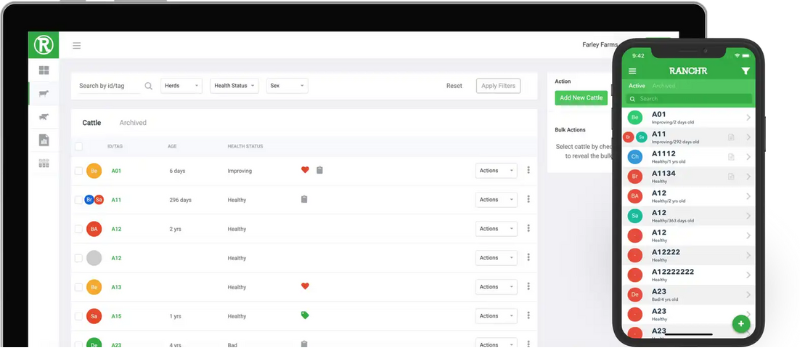Digital vs Paper Records: What Works Best for Cattle Ranching?
Published: October 30, 2024

Are you choosing between digital and paper records for your cattle ranch? Here's what you need to know:
Paper records: Cheap to start, familiar, but time-consuming and hard to analyze and scale with your farm over time
Digital records: Upfront investment, but saves time and offers better data insights
Quick comparison:
Factor | Paper Records | Digital Records |
Initial Cost | $13-$50 | $130-$500+ |
Ease of Use | Simple, no tech skills needed | Requires basic computer skills |
Data Analysis | Manual, slow | Fast, automated |
Accessibility | On-site only | Anywhere with internet connection |
Key takeaways:
Small ranches (<100 cattle) might do fine with paper
Larger ranches benefit greatly from digital systems
Consider your internet connection and computer skill level
Many ranchers use a mix of both systems
Popular digital tools:
Ranchr: Works offline, tracks health and genealogy
Cattlytics: Focuses on data analysis and reporting
Remember: The best system depends on your ranch's specific needs and resources.
Paper Records
Paper records have been a staple in cattle ranching for years. Let's look at the old-school methods, what's good about them, and the headaches they can cause in modern ranching.
Basic Paper Methods
Ranchers typically use three main paper-based systems:
Notebooks: Tough journals for jotting down info in the field
Cow Record Cards: One card per animal to track its history
Filing Cabinets: For keeping everything organized long-term
These tools help ranchers keep tabs on important stuff like calving details, health records, and how well each animal is producing.
I've been using an excel spreadsheet for many years very successfully. I have one for general herd information (Tag/Tattoo/name/DOB/Color/Sire/Dam) -@eaglesrun (reddit user)
What Works Well
Paper systems have some perks:
They're cheap to start using
You don't need tech know-how to use them in the field
Easy to replace when you run out
They can take a beating in rough outdoor conditions
For example, you can grab plenty of options for cattle log books on amazon starting at around $6. That's pocket change for small ranchers.
Common Problems
But paper records have their downsides:
Paper records can be a pain to store and keep safe. They make it tough to spot trends or whip up quick reports. Writing everything down by hand eats up time, and let's face it - sometimes your chicken scratch is hard to read later.
The USDA found that over 70% of small and medium cattle ranches still use paper records, even with these downsides.
Paper records are cheap and familiar, but they can slow things down as your ranch grows when it comes to updating it all by hand. That's a time-sucker.
To get the most out of paper records:
Use a calving notebook for quick notes in the field
Move that info to cow record sheets ASAP for a full history
Group cards by category (eg, age) so you can find them fast
Regularly toss out old records to keep your filing cabinet organized
Digital Records
Cattle ranching is going digital. More ranchers are ditching paper for computer and mobile-based record systems. Let's look at what's out there, why it's useful, and what problems ranchers face when going digital.
Current Tools
Two popular digital tools for ranchers are:
1. Ranchr

Our app works on your phone and computer. It lets you:
Use it offline
Track cattle health
Store up to 3 photos per record*
Keep tabs on calf history and family trees
Let up to 5 people use it*
Ranchr's Premium plan costs $10.83 per month which gives you unlimited records and premium features like, bulk actions and imports and offline mode (no more depending on internet access!)
2. Cattlytics
This app is all about data and reports. It offers:
Offline data entry that syncs when you're back online
Health monitoring for your cattle
Tracking where your cattle move
Managing your to-do list
These tools show how ranching is moving from paper to digital.
Key Benefits
Digital records beat paper in several ways:
1. Quick Data Entry and Analysis
You can input and crunch numbers right away. It's faster and more accurate.
"It covers everything we need for our cattle from start to finish and as an added bonus, it makes our vet happy too!" - Greg M. (Michell Beef) & Andy D. (Big Duke Beef)
2. Better Decision-Making
Digital systems can notify you about important events. This helps you breed better and keep your herd healthier.
3. Access Anywhere
No more lugging papers around or running back to the office. Your records are always with you.
4. Team Up Easily
Digital tools make it easier for your team to talk and share info. This makes running the ranch smoother.
5. Go Green
By using resources wisely and studying how cattle behave, digital practices help make ranching more eco-friendly.
Main Challenges
Going digital isn't always easy. Ranchers face some hurdles:
1. New Tricks
Learning new software often has a learning curve, especially if you're used to paper.
2. Keeping Data Safe
Digital records need to be secure. You need a way to backup or export records.
3. Tech Needs
Digital systems often need good internet and the right devices. Some ranches might not have these. (at Ranchr we took care of this problem since our app works offline).
4. Upfront Costs
While digital can save money over time, buying the software and hardware can be pricey at first.
To tackle these challenges:
Check if your ranch is ready for digital. Look at your internet, devices, and how you handle data now.
Pick software that does everything you need for cattle and keeps your data safe.
Look for systems that work offline. This helps if your internet is spotty.
Side-by-Side Comparison
Let's compare digital and paper record systems for cattle ranching. We'll look at costs, usability, and practical factors to help you pick the right option for your ranch.
Cost Breakdown
Factor | Paper Records | Digital Records |
Initial Cost | $13-$50 (notebooks, binders) | $130-$500+ (software, devices) |
Ongoing Expenses | Paper, ink, storage | Software subscriptions, upgrades |
Time Cost | High (manual work) | Low (automation or quick inputs) |
Paper systems cost less upfront, but digital systems can save you money long-term when you take into account the time you save.
Take Ranchr's Premium plan at $10.83/month. It might seem expensive, but it can save you hours of work each week. How much is your time worth?
Speed and Ease of Use
Data Entry:
Paper: Slow, error-prone, needs good handwriting
Digital: Fast, accurate, mobile-friendly
Data Analysis:
Paper: Time-consuming, limited insights
Digital: Quick, detailed reports at your fingertips
Information Sharing:
Paper: Tough, needs physical transfer and remembering to bring with you
Digital: Instant, multi-user sharing, most people have mobile phones on them at all times
"This app is great for tracking your cow calf herd. The 24/7 support has proven its worth.
I’ve emailed asking so many questions and they are quick to answer or fix any problems. They are also so very open to suggestions for their app since us ranchers have to stick together!
I would 100% recommend this app to any ranch" - TNDirkd Apple Store Reviewer
Real-World Factors
Ranch Size:
Small ranches (< 100 head): Paper might work
Medium to large ranches (100+ head): Digital becomes more useful
Staff Skills:
Tech-savvy team: Digital systems fit well
Traditional ranchers: Paper might feel more comfortable, but training can overcome digital onboarding
Working Conditions:
Poor internet areas: Paper or offline-capable digital systems like Ranchr
Good connectivity: Full-featured digital systems
Data Security:
Paper: Can be damaged or stolen
Digital: Password-protected, easy to backup and recover
Using Both Systems
Many ranchers find that a mix of paper and digital records works best. Let's look at how to use both and switch smoothly from paper to digital.
Mixed Methods
Using both paper and digital systems lets you get the best of both worlds. Here's how:
1. Field Notes to Digital Records
Jot down quick notes on paper when you're out in the field. Later, add the important bits to your digital system. This way, you can use tough paper notebooks when conditions are rough, but still analyze your data digitally.
2. Backup Important Papers
Keep physical copies of must-have documents like registration papers. But also scan them so you can easily find and share them digitally.
3. Go Digital Step by Step
Start by putting your most-used records into digital form first. You might begin with your herd list and calving records in an app like Ranchr, while keeping other stuff on paper for now.
Record Type | On Paper | On Computer |
Field Notes | Quick notes in tough notebook | Key info goes into Ranchr app |
Herd List | Backup copies | Main records in digital system |
Health Stuff | Original vet papers | Scanned copies and treatment logs in app |
Money Matters | Paper receipts | Digital bookkeeping software |
Steps to Switch
Changing to a mixed or all-digital system takes some planning. Follow these steps:
1. Look at What You Have
Check out your current records. Figure out which paper records you really need and which ones you can fully digitize.
2. Pick the Right Digital Tool
Choose a cattle app that fits what you need. Ranchr, for example, has a free plan with unlimited records for basic needs, which could be a good place to start.
3. Fresh Start
Begin your digital journey with your current active herd. Philip Speake, who started Ranchr, says:
"Start with your active animals and their current info before adding old data. This way, you're working with the most up-to-date info from day one."
4. Scan New Information
Pick a date to start scanning all new papers. This way, you'll slowly build up your digital records while keeping the physical papers you need.
5. Train Your Staff
Make sure everyone on your ranch knows how to use both paper and digital systems. Show them how to use the new digital tools and make some simple guides.
6. Check and Adjust
Set times to see how well your mixed system is working. Be ready to change things based on what works best for your ranch.
Picking the Right System
Choosing between digital and paper records for your cattle ranch? Let's break it down.
What to Check First
Before you jump in, think about:
Ranch Size: Got under 100 head? Paper might do. Bigger ranch? Go digital.
Tech Skills: Your team good with computers? Try Ranchr for Free
Internet: Bad connection? No problem. Ranchr works offline.
Money: Paper's cheap upfront, but digital saves cash long-term.
Data Needs: Need quick analysis? Digital's your friend.
Here's a quick comparison:
Factor | Paper Records | Digital Records |
Initial Cost | $13-$50 | $130-$500+ |
Data Analysis | Slow, manual | Fast, automated |
Space Needed | Lots | Little |
Access | On-site only | Anywhere (with internet) |
Security | Can get damaged | Encrypted, easy backups |
Getting Started
Ready to roll? Here's how:
1. Start Small
Focus on your current herd first.
2. Pick Your Tool
Digital? Try Ranchr (free plan available).
Paper? Get sturdy notebooks and files.
3. Set It Up
Organize logically and categorize. For digital, learn the software inside out. Be sure to email support if you need help getting started.
4. Train Staff
Make sure your team knows how to use it right.
5. Go Slow
Switching to digital? Start with your most important records.
6. Check and Adjust
Set times to review how it's working. Adjust as needed.
*requires premium subscription
Keep track of all your cattle with the #1 Cattle Management Software
Try out Ranchr today for free